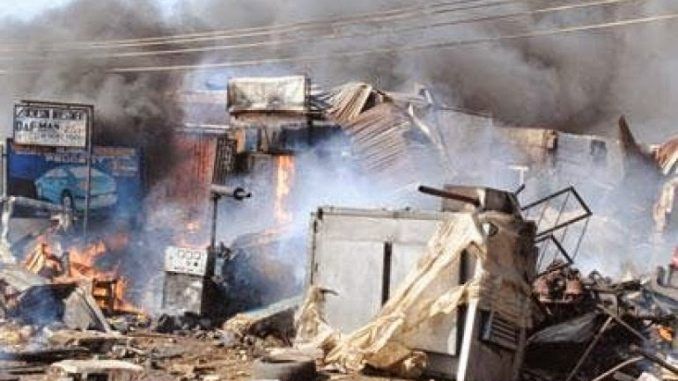
At least thirty-two people were killed and eighty wounded after an explosive device went off at a market in the North Eastern city of Yola in Nigeria.
The explosion occurred at a fruit and vegetable market beside a main road in the Jimeta area of Adamawa’s state capital around 1900 GMT.
It is still not clear who was responsible for the blast, but the Boko Haram group have carried out attacks on Yola in the past, including suicide bomb attacks.

BYPASS THE CENSORS
Sign up to get unfiltered news delivered straight to your inbox.
You can unsubscribe any time. By subscribing you agree to our Terms of Use
Al Jazeera reports:
The area, also housing a live stock market, was crowded with shoppers.
“The ground near my shop was covered with dead bodies. I helped to load 32 dead bodies into five vehicles,” witness Alhaji Ahmed, who owns a shop in the market, told the Reuters news agency.
There was no immediate claim of responsibility but officials will likely pin the blame on the armed group Boko Haram which has killed thousands in its bid to create a state adhering to Islamic law in the northeast.
The group has previously attacked Yola with suicide bombs and improvised explosive devices.
Tuesday’s bombing came less than a month after at least 55 people died when suicide bombings struck two mosques in different cities in northeast Nigeria.
A massive blast on October 24 in Yola killed 27 people during a Friday afternoon prayer that included officials helping to inaugurate a new mosque, the National Emergency Management Agency said.
Earlier on the same day in the city of Maiduguri – the capital of Borno state and birthplace of the armed group Boko Haram, another suicide bomber killed 28 people in an attack on a mosque.
Last Friday, President Muhammadu Buhari was in Yola to decorate soldiers for bravery in the fight against Boko Haram as well as visit a camp for people displaced by six years of violence that have left at least 17,000 people dead.
He told troops he believed Boko Haram “are very close to defeat” and urged soldiers “to remain vigilant, alert and focused to prevent Boko Haram from sneaking into our communities to attack soft targets”.

